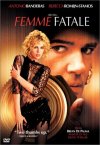BUY THE DVD:
|


|
|
|
SYNOPSIS:
| |
a woman tries to straighten out her life, even as her past as a con-woman comes back to haunt her.
|
|
|
MOVIE FACT:
| |
john stamos is uncredited as the "cheesey agent" who contacts antonio's character on the phone.
|
|
|
RATING:
|

one out of four possible stars
|
|
|
|
Though the movie poster might have audiences thinking that this movie just oozes sex appeal, the romance in Femme Fatale is tepid, like a lukewarm cup of coffee. The film's premise is intriguing at first glance, but it isn't carried out with enough style on the screen to warrant much attention. It looks to be a cross between a slick European thriller and a classic film noir, but there is a lot more style than substance on the screen and its hard to sit through a film whose plot is impossible to understand.
While director Brian De Palma might have thought the lack of story information given to the audience would make for interesting cinema, Rebecca Romijn-Stamos's flat leading performance does not have enough momentum to hook the viewer. Though her lingerie-style wardrobe covers a stunning body, unless people attend this movie solely to have a look at Romijn-Stamos's under things, this film will grow tiresome rather quickly.
Beginning with a protracted opening sequence that details a heist-gone-wrong, the film steps off on the wrong high-heel with the opening frame and never regains its footing. Romijn-Stamos's character, "Laure," has a job that includes stealing a ten million dollar jewel-studded bra during the screening of a movie at the Cannes Film Festival. That expensive piece of jewelry hangs on a wafer-thin model that Romijn-Stamos gets frisky with in the bathroom while stealthily exchanging the real jewels for fake ones.
Unfolding like an episode of "Mission: Impossible," the heist seems to be going as smooth as glass, until a few guns are drawn and Laure's partner in crime, played by Eriq Ebouaney, gets shot by a guard. Ebouaney's character is sent to prison for seven years and when he gets out of the slammer, he makes it his priority to hunt down Laure and find the ten million dollars. Just to get to Ebouaney's release from prison though takes a good twenty minutes. Like many parts of this film, the beginning scene could have had a lot of extemporaneous time chopped out of it.
There was very little story revealed during this first scene, and since no plot was explained, the covert operation tactics became repetitive. And in point of fact, the first seventy-five minutes of this film could have been cut significantly. Ironically, the sex appeal from either Romijn-Stamos's character or Antonio Banderas's seedy ex-paparazzi character, "Nicolas," is non-existent for most of the film. The plot is just so confusing and watching their beautiful faces on the screen as they wander through scene after scene is not enough.
De Palma, who also received the sole writing credit on the film, should have included more dialogue between these flaccid characters to make for some exciting repartee. And even when Laure and Nicolas slip between the sheets, metaphorically speaking, the steamy factor isn't increased very much. It might be a lack of chemistry present between these on screen lovers that dooms their relationship. In fact, Romijn-Stamos's lip-locking with the diamond wearing model at the beginning of the movie is more believable than any feelings she and Banderas seem to have for one another during the film.
Something else which ensures that Laure won't find sympathy with the audience is the way viewers have to wait until the very last few scenes to find out about her true character. As her character says in the film she's "bad. Real bad" as a person, and whether she escapes with her freedom and life intact are items of negligible interest. De Palma definitely tries the patience of his viewers with this film and doesn't make it easy to just sit back and enjoy his confusing creation. Even if the dialogue in the film wasn't applied to the plot or story, some additional conversation between Romijn-Stamos and Banderas might have served their characters well.
It might have even made their relationship more believable. But not only are the sequences with dialogue too few, the actual sound of the dialogue is not of the best quality. Though many of the accents in this film are French, the delivery of the dialogue is not always easy to understand. But the accented speech is not to blame. It's the actual sound of the movie. It's like the boom guy was standing too far away from the actors to get a proper level for the dialogue. Perhaps De Palma wanted the film to resemble something more mysterious, with unintelligible dialogue throughout it, but it just makes the plot harder to understand.
Though it should be said that the last ten minutes of this film take the explanation of the plot to the extreme. During the all-important "reveal" at the end of the film, the slow motion and repeating frames mark a 180-degree change from the mysterious tactics used in the middle. The end is much too drawn out (kind of like the first scene), but with one difference: there is too much information given to the audience. The conclusion is simple to understand, but De Palma beats his idea into the audience much to hard right before the end titles start to appear. To sum up, Femme Fatale is neither steamy nor believably sexy, and with no standout performances, this film marks a low in recent cinema thrillers.
Review by Kelsey Wyatt.
| |
|